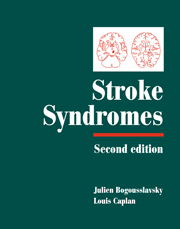Book contents
- Frontmatter
- Contents
- List of contributors
- Preface
- PART I CLINICAL MANIFESTATIONS
- 1 Stroke onset and courses
- 2 Clinical types of transient ischemic attacks
- 3 Hemiparesis and other types of motor weakness
- 4 Sensory abnormality
- 5 Cerebellar ataxia
- 6 Headache: stroke symptoms and signs
- 7 Eye movement abnormalities
- 8 Cerebral visual dysfunction
- 9 Visual symptoms (eye)
- 10 Vestibular syndromes and vertigo
- 11 Auditory disorders in stroke
- 12 Abnormal movements
- 13 Seizures and stroke
- 14 Disturbances of consciousness and sleep–wake functions
- 15 Aphasia and stroke
- 16 Agitation and delirium
- 17 Frontal lobe stroke syndromes
- 18 Memory loss
- 19 Neurobehavioural aspects of deep hemisphere stroke
- 20 Right hemisphere syndromes
- 21 Poststroke dementia
- 22 Disorders of mood behaviour
- 23 Agnosias, apraxias and callosal disconnection syndromes
- 24 Muscle, peripheral nerve and autonomic changes
- 25 Dysarthria
- 26 Dysphagia and aspiration syndromes
- 27 Respiratory dysfunction
- 28 Clinical aspects and correlates of stroke recovery
- PART II VASCULAR TOPOGRAPHIC SYNDROMES
- Index
- Plate section
11 - Auditory disorders in stroke
from PART I - CLINICAL MANIFESTATIONS
Published online by Cambridge University Press: 17 May 2010
- Frontmatter
- Contents
- List of contributors
- Preface
- PART I CLINICAL MANIFESTATIONS
- 1 Stroke onset and courses
- 2 Clinical types of transient ischemic attacks
- 3 Hemiparesis and other types of motor weakness
- 4 Sensory abnormality
- 5 Cerebellar ataxia
- 6 Headache: stroke symptoms and signs
- 7 Eye movement abnormalities
- 8 Cerebral visual dysfunction
- 9 Visual symptoms (eye)
- 10 Vestibular syndromes and vertigo
- 11 Auditory disorders in stroke
- 12 Abnormal movements
- 13 Seizures and stroke
- 14 Disturbances of consciousness and sleep–wake functions
- 15 Aphasia and stroke
- 16 Agitation and delirium
- 17 Frontal lobe stroke syndromes
- 18 Memory loss
- 19 Neurobehavioural aspects of deep hemisphere stroke
- 20 Right hemisphere syndromes
- 21 Poststroke dementia
- 22 Disorders of mood behaviour
- 23 Agnosias, apraxias and callosal disconnection syndromes
- 24 Muscle, peripheral nerve and autonomic changes
- 25 Dysarthria
- 26 Dysphagia and aspiration syndromes
- 27 Respiratory dysfunction
- 28 Clinical aspects and correlates of stroke recovery
- PART II VASCULAR TOPOGRAPHIC SYNDROMES
- Index
- Plate section
Summary
The auditory and vestibular systems share the same end organ and cranial nerve, yet vestibular signs and symptoms are common with stroke, whereas hearing disturbances are much less frequent. Several reasons would appear to account for this striking dissimilarity. One is that the auditory pathway is less ubiquitous than the vestibular pathways (Nieuwenhuys et al., 1988). The likelihood that a stroke involves the auditory pathway is, therefore, less on this basis alone. A second difference, to our knowledge not previously reported, is that the auditory pathway is often spared by the most common strokes. This is because major parts of the auditory pathways, such as the cochlear nucleus, the inferior colliculus and the medial geniculate body have multiple sources of blood supply (Duvernoy, 1978). A third well-recognized factor is the redundancy of the central auditory system and its strong bilateral representation above the level of the cochlear nuclei (Webster, 1992). Consequently, rostral to the cochlear nuclei, gross deficits in hearing, such as measured by standard pure-tone audiometry and speech discrimination only occur if lesions are bilateral. Furthermore, widespread bilateral lesions of the auditory system typically render the patient unable to respond or are incompatible with life. In contrast, language disorders are more frequent because language is usually unilaterally represented in the cortex. Certainly, cerebral stroke often includes the auditory system, resulting in various types of auditory disorders, but most hemispheral lesions produce subtle hearing dysfunctions that can only be detected with sophisticated psychoacoustical and electrophysiological testing.
The purpose of this chapter is to provide an overview of the auditory system and its blood supply and to review how auditory processing can be affected by stroke.
Information
- Type
- Chapter
- Information
- Stroke Syndromes , pp. 144 - 161Publisher: Cambridge University PressPrint publication year: 2001
Accessibility standard: Unknown
Why this information is here
This section outlines the accessibility features of this content - including support for screen readers, full keyboard navigation and high-contrast display options. This may not be relevant for you.Accessibility Information
- 5
- Cited by
